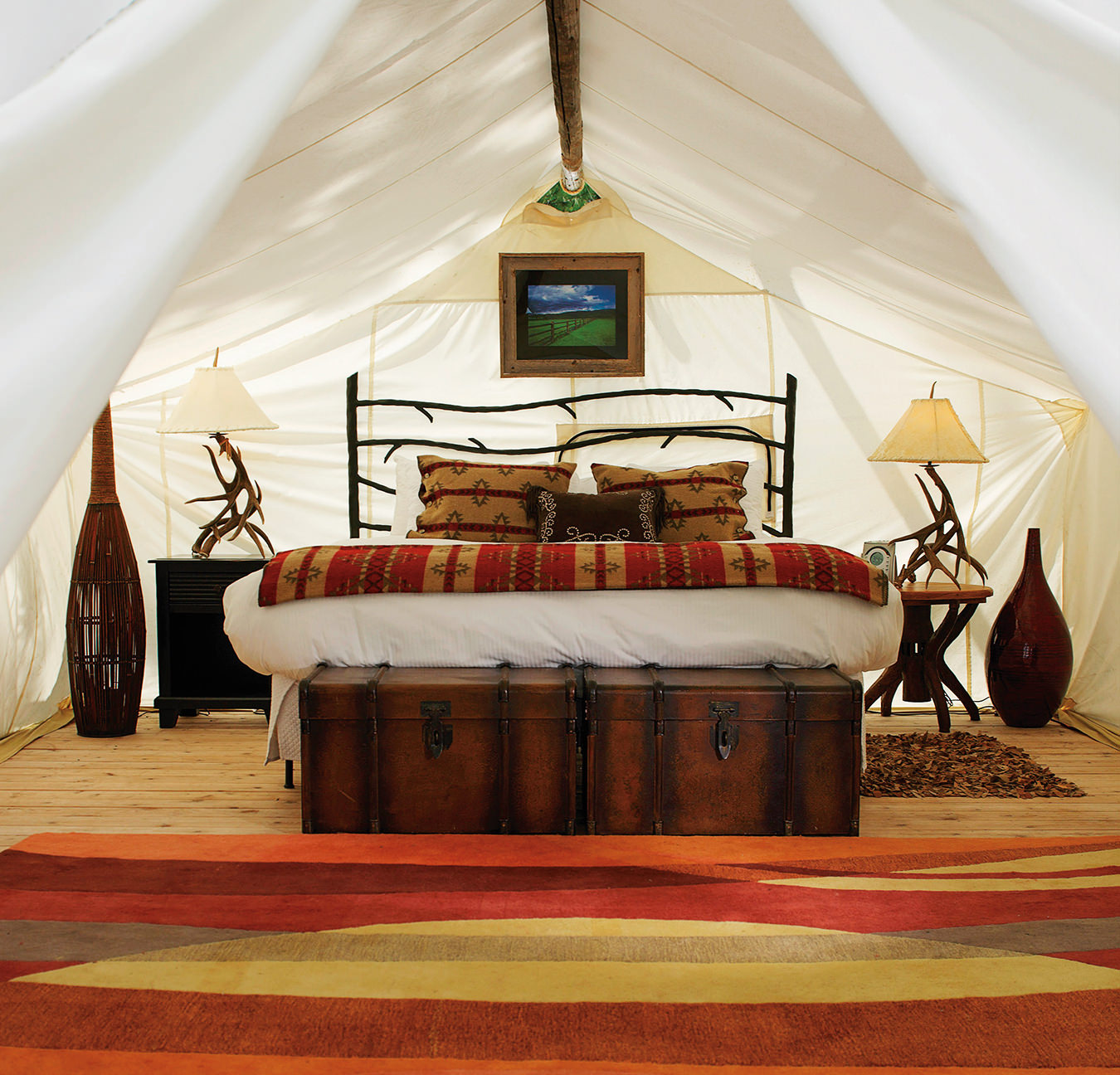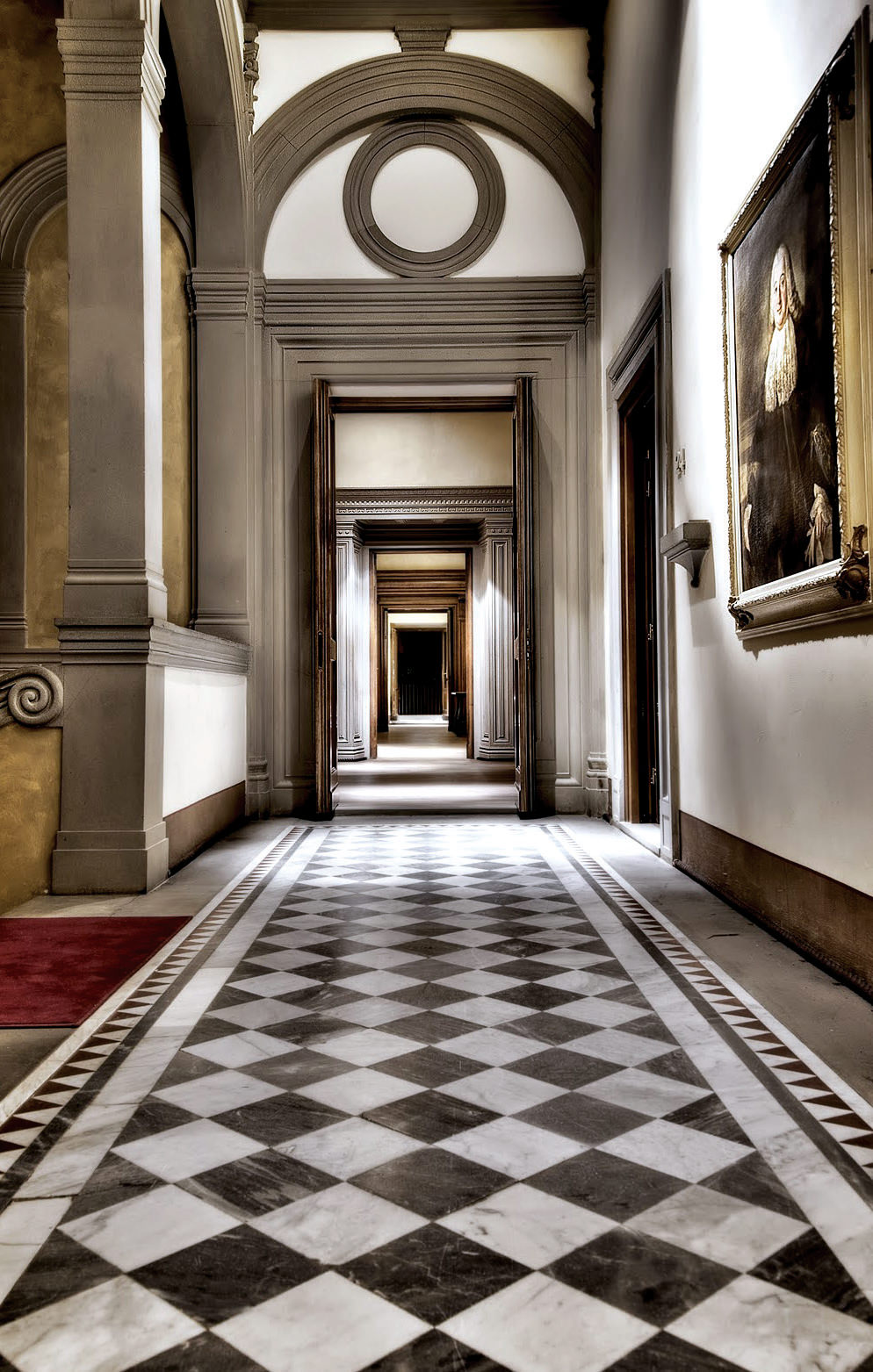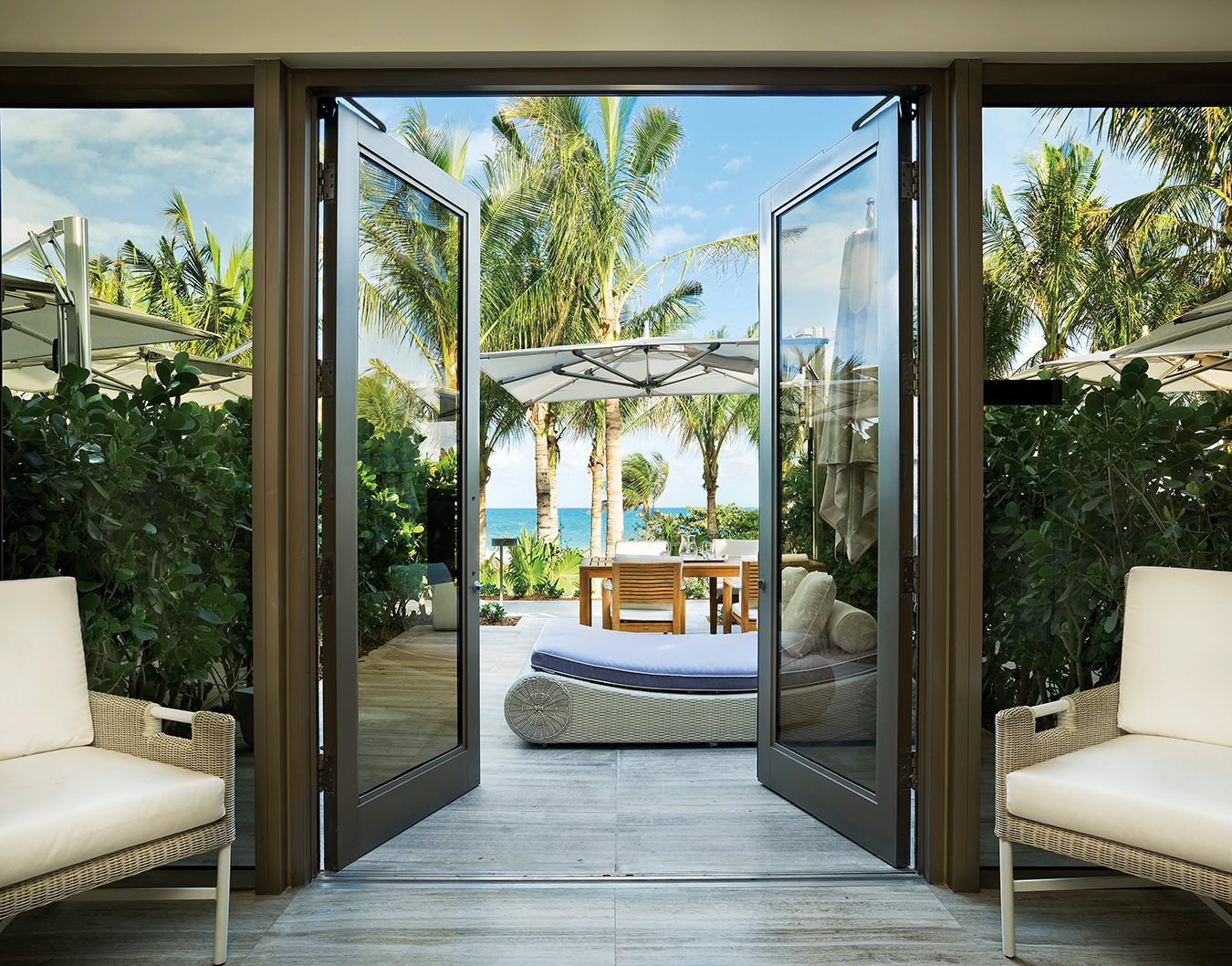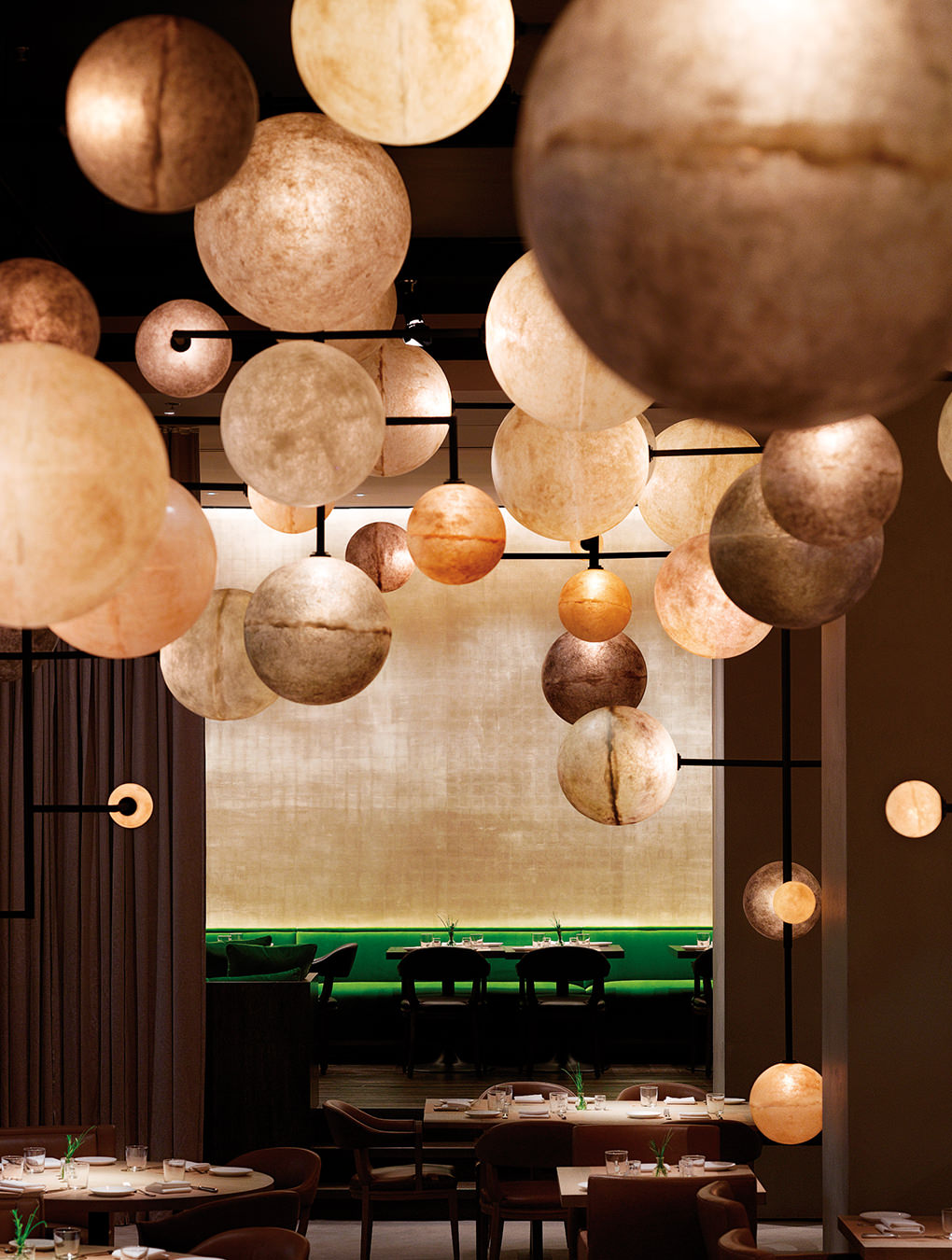The Wickaninnish Inn
Storm watching on the edge of the world.
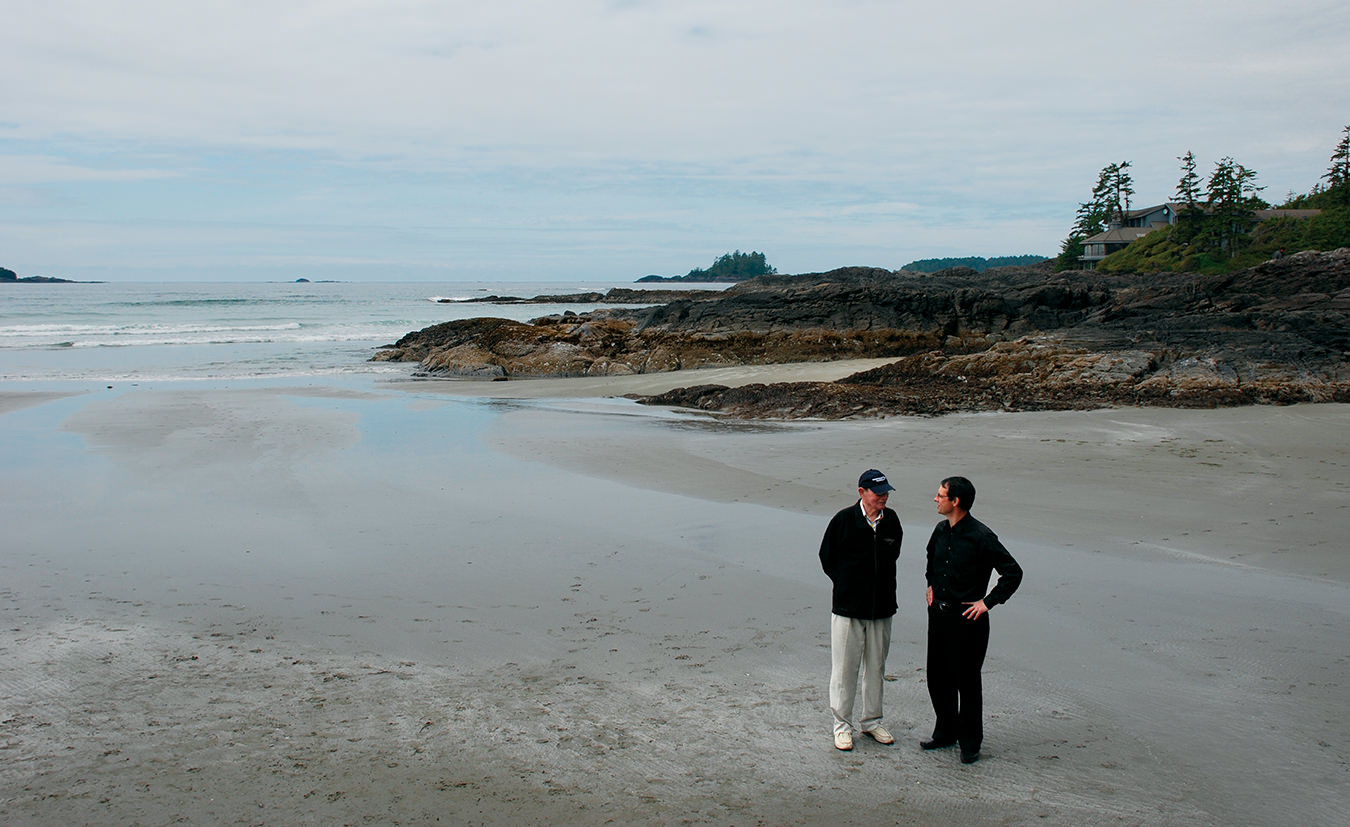
Charles McDiarmid looks out to the horizon. Thick grey clouds are scudding overhead, a gale is howling onto the shore, waves crashing on the rocks.
“Storm coming,” he says, rubbing his hands. “Going to be a good one.”
Guests of the Wickaninnish Inn know it, too. Instead of hunkering down in the lounge around the fireplace, toddies ablaze, folks are out on the crescent-shaped sand beach in their rain gear, waiting for the storm to come ashore in full.
It’s another day in paradise at the Wickaninnish Inn, located at Chesterman Beach in Tofino, British Columbia. The inn is perched on the ocean side of Vancouver Island, about as far out to sea as possible on Canada’s West Coast. The next land mass, just out there past the rocks: Japan. It is indeed, as the tag line reads, “the original winter storm-watching destination”.
There are those who think of paradise in terms of blue skies and azure seas, swaying palms and gently rolling waves, and that’s just fine for them. Then there are those of us who like nothing better than the heavily clouded and tempestuous scenario painted above. We’re waiting for the wind and the rain and the pounding surf. We’re here, savouring rustic elegance on the edge of the world—at the Wickaninnish Inn.
It’s been 12 years since its opening, and “the Wick”, as it’s known to its friends and habitués, hasn’t even really hit its stride. But it has picked up an incredible following since opening its gorgeous, Native-motif, hand-carved wooden doors in August 1996. A year and a half later, it became a proud member of the worldwide luxury-hotel group Relais & Châteaux. And it hasn’t looked back.
And what sort of person would have such a vision in the first place? Charles’s father, Howard McDiarmid, known to most as Howie. That story starts in the 1950s, when Howie was working his way through medical school as a bellhop at the legendary Fairmont Banff Springs Hotel. After graduating as a doctor of medicine, he moved to Tofino.
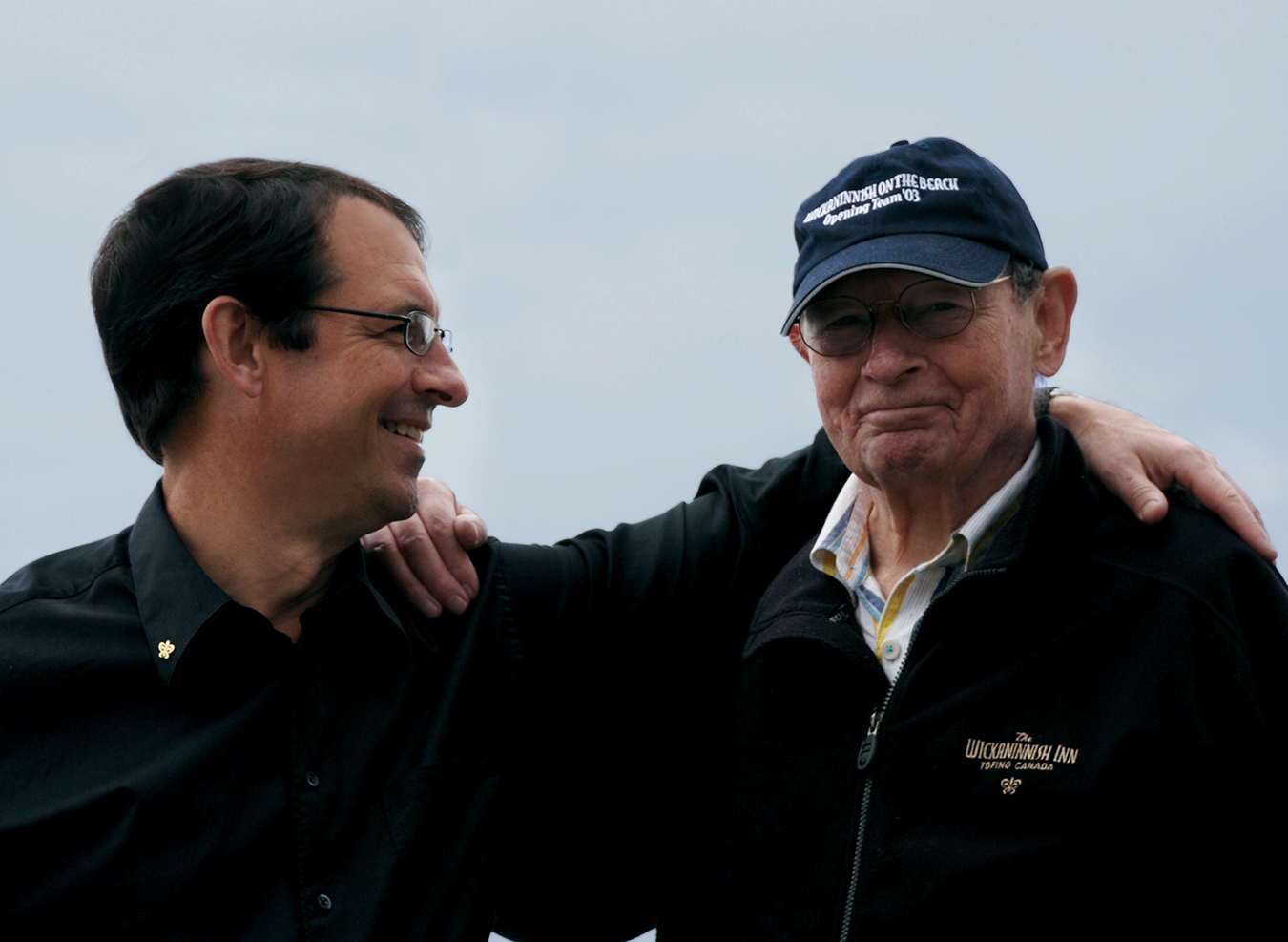
There was no road into town back then, and boats and a flotilla of float planes serviced the coast. It was a time when the storms were not quite as welcome as they are now; the appearance of a cumulonimbus often meant being stuck on the ground, in Victoria or Vancouver, Nanaimo or Port Alberni, waiting for the clouds to clear.
Howie was considering the position of resident physician in a few small lumber communities, the towns of Tahsis and Zeballos among them. So he flew in to Tofino, which was the drop-off point. But rumour had preceded him, and no less a local luminary than the town’s mayor met him at the float-plane dock.
The town had just built a hospital but needed a doctor, and the mayor got right to the point: “Never mind Tahsis—come here instead.” Barely off the strut of the float plane, the good doctor looked at the dock, which was lined with townspeople holding banners bearing welcome to their (hopefully) new doctor.
Some of us like nothing better than the rain and the pounding surf. We’re here, savouring rustic elegance on the edge of the world—at the Wickaninnish Inn.
Howard McDiarmid never did make it to Tahsis or Zeballos. He loved the welcome, the town, the people. He decided to stay and become the first resident doctor, intending to build up the medical practice in Tofino at the recently opened hospital, then sell it and get a practice in the big city.
But that never happened; there was too much going on. Charles McDiarmid was born in 1956. The road to Tofino opened in 1959. The Pacific Rim National Park Reserve was created right around them, literally, in 1971. And all the while, Howie began to acquire property along a fabulous stretch of beach called Chesterman Beach. And as the land came together, so too did an idea.
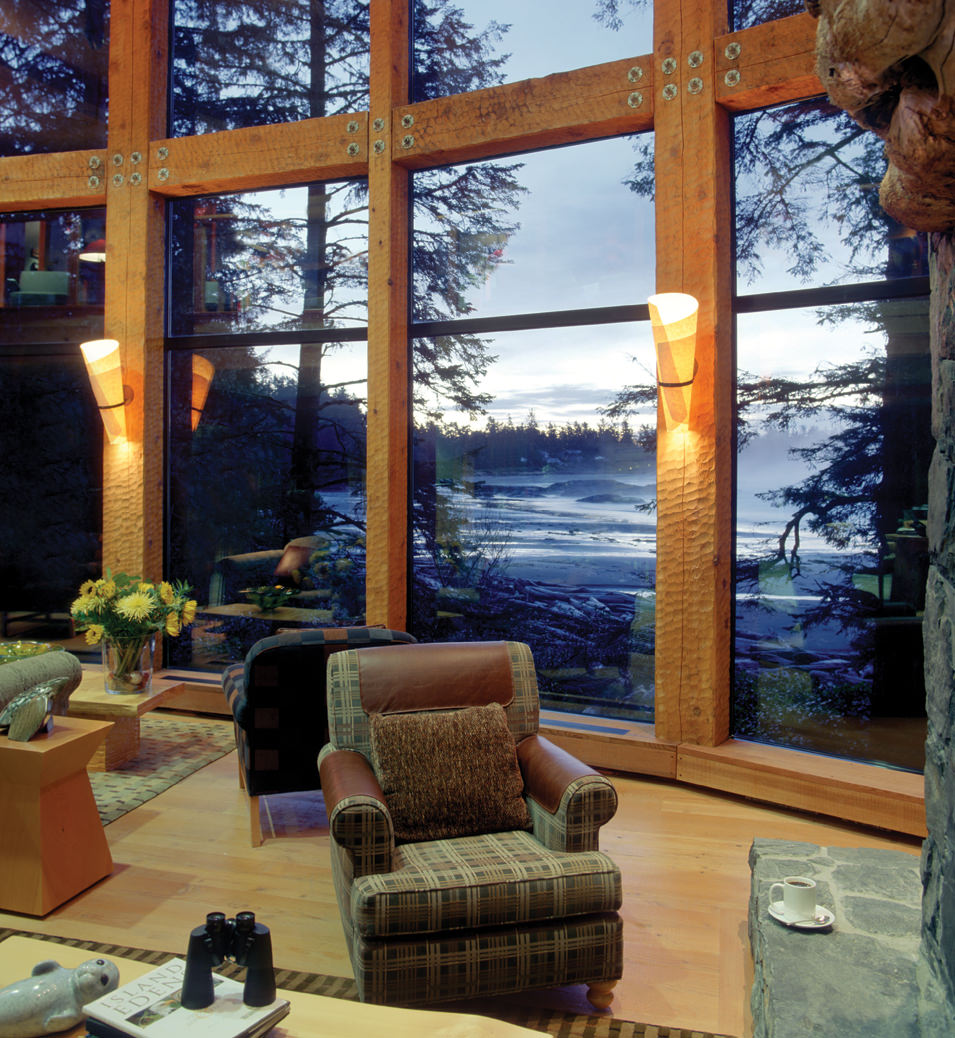
View from the Beach Lounge. Photo by Ivan Hunter.
The term inn wasn’t really in the working vocabulary at the time; in fact, Howie McDiarmid was thinking about more modest accommodations. Looking over the land he thought, “One day, I’m going to build a motel here.” That notion became his dream, his mantra.
Years turned into decades. Time and the town itself took its toll, and the plans for a big-city medical practice faded into the background. There was work to be done here—there was a motel to build. The time had come to make the earth move.
Meanwhile, by the late 1980s, Charles McDiarmid was a seasoned hotelier. He had a degree from Cornell University and more than enough experience under his belt: positions at Four Seasons and Delta hotels and convention and visitors’ bureau of various stripes and sizes, a season of herring fishing, another in the snows of Whistler, the obligatory tour of Europe.
In 1993, Charles and the family rallied and made serious plans about how to achieve the dream. “I wrote a business plan for the project, late at night when I was director of sales for the Four Seasons Olympic Hotel in Seattle,” says Charles. “We finally got the property rezoned. I moved to Vancouver, started to pursue equity financing, shopped the plan to potential partners and backers, and finally moved to Tofino in 1995. It was time to start work, hands-on, co-managing the construction of the Inn.”
It wasn’t without turmoil, either. “We did run into some classic Nimbyism,” he recalls. But the town itself—some five, six miles down the new road—supported the project virtually unanimously. “We showed them what we planned to do and how we planned to do it. And the town knew our family motto, our working ethic, which was basically, ‘We do what we say we will do.’”
The project lumbered into action, and in June of 1995, road, sewer, hydro, cable and water all began to arrive. Site prep was in high gear, and in September, Charles McDiarmid recalls, “Things started to come in instead of going out.”
A year later—August 9, 1996—was opening day. The Wickaninnish Inn was a reality.
It was Charles who came up with the idea of making a virtue out of what some might consider nasty weather. “It just seemed to make solid sense,” he says. “I mean, why hide the obvious fact: we get a lot of rain and a lot of storms here. They’re magnificent.”
The storms are legendary. People will say that they’re going to the Wick for the weekend, and the reply of “Hope you get some good storms” is almost automatic from the cognoscenti who’ve been there, done that and keep coming back.
“When the family would get together at the cabin, in the old days before the Inn, we always hoped there would be a good storm,” recalls Charles McDiarmid. He remembers with nostalgic fondness the “shrieking winds, 30-foot logs pounding the rocky beach. There is this really unusual sound the storms made, like a tuning fork vibrating.” Here on the beach, he proudly makes one of those expansive, sweeping gestures that encompass everything you can see. “This is the best location on the West Coast of North America—from Alaska to Mexico—for watching storms.” It’s translated into a big part of the raison d’être of the Inn. (Hence the rain gear: umbrellas and hats and emergency lanterns are included in the amenities.) It was and remains a stroke of marketing genius, and it’s one of the reasons the Wick is frequently full during the winter season, traditionally a slow time for beachfront resorts in this hemisphere.
And there are the dog accoutrements. The Wick has been dog-friendly from the very start. Advise them when you book and there will be ground-level, dog-accessible accommodations waiting for you, as well as dog beds, bowls, blankets, towels, waste bags, biscuits and a toy, as well as a copy of the current month’s Modern Dog magazine.
The Wick takes its local colour seriously, from seafood to Pacific Northwest wines, heavy on the British Columbians. A stack of B.C. musicians’ CDs sit in the drawer under the player: Diana Krall, the Marc Atkinson Trio, others. But man (and woman and child, even beast) cannot live by great storms and cool music alone. Sooner or later, we’ll want to eat.
Fine food was factored into the project from the beginning. After all, in order to qualify for the Relais & Châteaux designation, you have to have it. And it has to be better than just good. It has to be great. World-class. Which it is.
The Pointe Restaurant is an impressive space, carved-beam round, with a big fireplace in the centre and windows looking out over the rocks and the waves. You can’t see the kitchen. But in a minute, you can taste it. “We always wanted to have the best of the best in our kitchen,” says Charles, so the chef who opened the place is one of the West Coast’s legends. Rodney Butters came here with high ideals to match McDiarmid’s even higher expectations. And it’s worked; the Pointe has become—in the time-honoured tradition of many of the world’s great inns that have outstanding restaurants and are often located in out-of-the-way places—a site of spectacular cuisine.
Butters opened the place with a hand-picked team, and Charles wouldn’t have wanted it any other way. “He set the standard of excellence in our food program—standards that are being adhered to today.” He was eventually followed by Andrew Springett, who departed Vancouver’s legendary fine-dining hotel space Diva. It was Springett who maintained the level, adding a different creative twist, and really got behind one of the Wick’s most popular summertime food events, the crab cookout on the beach. Then came Tim Cuff, who arrived from the Terrace restaurant at the Mission Hill Family Estate Winery. Currently, John Waller leads the sizeable culinary team. Formerly of Calgary’s Teatro, he’s happily in charge, having received the promotion to executive chef after barely two years.
Waller changes the special tasting menus twice weekly to reflect what’s available locally. This tradition was started by Butters, who made a point of getting to know local producers, farmers, fishermen and mushroom hunters, and encourage them to come to the Wick with high-quality food.
The cellar has become legendary, and emphasizes the amazing wines and wineries of British Columbia, as well as other leading Pacific Northwest labels. The malt-whisky list is just as impressive. Do two, three different ones a night and you could make your way through it in a month of storms. Maybe.
All of this is held together by a skilled and sensitive staff that is personally trained by the Wick’s senior management. Charles created staff housing on-site, and is a firm believer in promoting from within. Each new employee attends a full-day orientation workshop titled “You Are the Experience”, and every staff member takes it again once a year. Service standards are as high as those for food and drink and creature comforts.
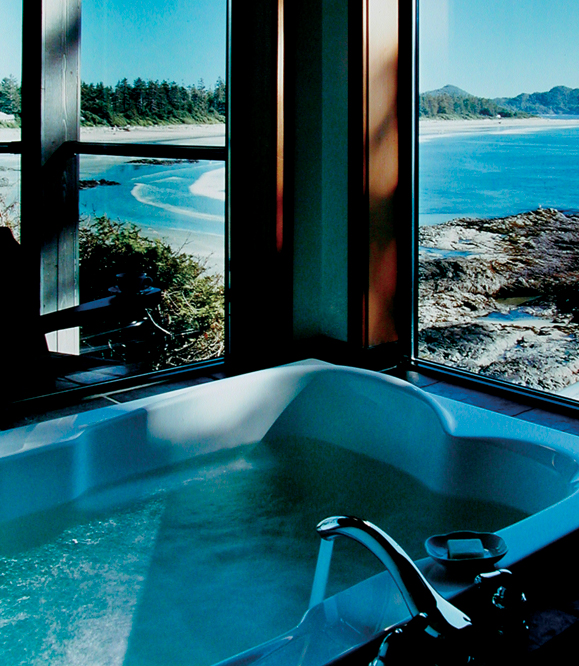
Bathroom view of Chesterman Beach. Photo by Rob Melnychuk.
The Wickaninnish inn takes its local colour seriously, from seafood to Pacific Northwest wines, heavy on the British Columbians. Which include the Ancient Cedars Spa. It is set on the ocean level of the main building, nestled in the forest fringe, adjacent to the wave-dashed rocks looking out over the open Pacific. Here, certified professionals provide a journey into the world of well-being, emphasizing relaxation and rejuvenation in harmony with nature. It is an Aveda Destination Spa, featuring their line of products and based on the holistic principles of Ayurvedic medicine and hatha yoga. With seven separate treatment rooms, the spa is as popular as the restaurant—maybe even more so.
All said and done, the Wick’s status on the Relais & Châteaux list comes as no surprise.
“Right from the very beginning, the concept and planning stages, I had Relais & Châteaux in mind,” says Charles McDiarmid. “If we could get that…” He trails off, staring out at the endless sea when he reminisces.
He delights in recounting how it came to be. “We knew we wanted it, but we didn’t know how to go about getting it.” One day he picked up the phone, called the group’s New York headquarters—on the main 1-800 number—and was put through to the extension of Robert Gagnon, of Quebec’s legendary Auberge Hatley (wich was tragically destroyed by fire in 2006).
Gagnon’s role was to ensure a smooth liaison between the French originators of the group and the North American young upstarts and wannabes. McDiarmid wanted to get ahold of the list of requirements for Relais & Châteaux membership. He didn’t get through to Gagnon but talked at length with the woman who picked up. Finally, a little frustrated at the lack of concrete information to be had, he asked, “So how do you become a Relais & Châteaux member?” The woman paused not a second and said, “Well, either you are, or you are not.” Charles decided then and there that the Wick most certainly was.
Endless calls to Gagnon ensued. None were returned. Charles finally connected with the group’s Paris headquarters. And eventually, the legendary Gagnon called to set up a time to inspect the property.
He arrived with his wife for dinner in September of 1997, a year after the Wick opened. “It was a great dinner,” Charles recalls. “Good conversation, conviviality, excellent wine, fine food.” Gagnon was impressed, and the Wick joined Relais & Châteaux at the Congress in Bordeaux in 1997, becoming one of 16 properties presently in Canada, and one of only six in the West.
And what’s in the future? Charles McDiarmid is energetic, boundlessly enthusiastic and hard to keep standing or sitting still. More expansion? Maybe. “It might be nice to see it happen,” he muses. And then there’s another thought: “I’m thinking, perhaps, an Okanagan-based property—aspiring to Relais & Châteaux status, of course—and capitalizing on the burgeoning B.C. wine region. It would be a great step for the wine and food industry in the province—and a terrific way station between Calgary and Vancouver. Maybe the start of a Route du Bonheur, Western Canada version.”
I know I’ll reserve a room—even if it’s all sunshine, and not a cloud in sight. But I will always come back to the edge of the world and wait for a really good storm.

